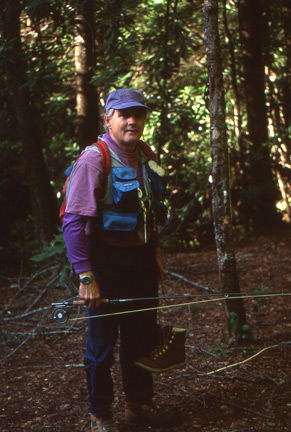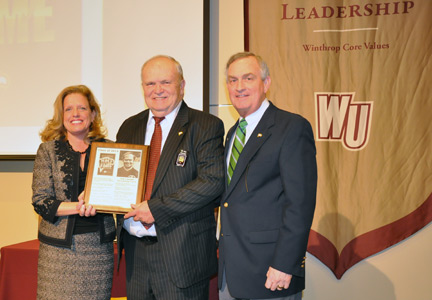Jim Casada Outdoors February 2014
Newsletter
|
| Jim Casada 1250 Yorkdale Drive Rock Hill, SC 29730-7638 803-329-4354 |
Web site:
www.jimcasadaoutdoors.com |
Click here to view this newsletter in a .pdf with a white background for easy printing.
Amidst a Mess of MollygrubsUnless you hail from the southern Appalachians or recall me having used it in the past, chances are you aren’t familiar with the word mollygrubs (sometimes spelled mullygrubs or mulligrubs). It is a term in common usage, especially among old timers, in the Smokies, but evidently not often spoken elsewhere. In my edition of Webster’s Collegiate Dictionary it barely merits mention as slang with definitions being “in the dumps” or “blues.” On the other hand, in a wonderful reference work which regularly gives me constant comfort and information, the Dictionary of Smoky Mountain English, the meaning of mollygrubs is made abundantly clear with definitions including “ill temper, sulkiness, despondency, [and] vague unwellness.” In present personal circumstances, the one of these which is most accurate is despondency. The last couple of weeks have been tough ones for me for several reasons. First and foremost, a fellow with whom I have hunted, camped, and especially fly fished, Dr. Robert Scoville, died early this month. The tribute below will give you some slight indication of the man and what he meant to me, although it merely scratches the surface of one of those special relationships which are forged through shared outdoor experiences. Robert entered the hospital on the day of his 50th wedding anniversary after a bout with flu had developed into pneumonia. I had a bad feeling about things—one of those instinctual reactions which is impossible to define tracing back to man’s earliest existence when his existence often depended on his senses—and several unreturned phone calls to family members heightened my concern. Then in the early morning of February 5 the phone rang. It was my wife, who was out running some errand, informing me that she had just learned Robert had died the previous night.
When you read the words below, unless I have failed miserably in my mission as a sporting scribe, you will realize just how much I cherished the man and our friendship. Losing a companion of many decades is enough to give anyone the mollygrubs, and it should also serve as a reminder to everyone who reads this. I urge you to take time to pause and ponder on the bonds you have established through being afield or astream with folks sharing common passions. Cling to those passions and those people—they are treasures beyond material measure. |
Jim’s Doings Blessedly, alongside the woes cataloged (left), there was a weekend of truly special wonder. I had indicated in an earlier newsletter that I was going to be inducted into the Winthrop University Athletic Hall of Fame in recognition of my efforts in starting the institution’s soccer program for men and serving as head coach for the first dozen years of its existence.
The highlight of a weekend devoted to my induction, along with that of eight student-athletes (one of them a great soccer player by the name of Larry Tavino whom I had coached and who was also Winthrop’s first Rhodes Scholarship nominee), was that I received a splendid surprise. Some two dozen or more of the fellows I had coached—and remember this was 30 years ago and longer—showed up for the banquet. They flew and drove from places as remote as California, the Midwest, and the northeast, and seeing their faces and hearing of their life stories in the decades since graduation was gratifying in the extreme. When I see what they’ve accomplished as teachers and preachers, lawyers and entrepreneurs, financiers and fathers, coaches and accountants, solid citizens and family men, I have to be pleased. Most of all, I take pride in thinking maybe, just maybe, I had some small role in making them successes in the ultimate game, the one we call life. If nothing else, being around them, especially given that the beginning of the event came less than half an hour after I had tearfully been hugging the wife of Robert Scoville and their three lovely daughters, provided a much-needed boost in my spirits. Beyond that, I must admit that in all likelihood in recent days I’ve spent too much time contemplating the fleeting nature of our existence. If there is a positive side to that, it involves realization that I probably need to pay more heed to the Latin phrase, carpe diem (seize the day). For that matter, so do all of us. Recent Reading For me, reading is one of the ongoing, omnipresent aspects of my existence, and even the midst of a bout of mollygrubs I can lose myself in a book. One such writer is Wilbur Smith, a splendid South African novelist who has written dozens of novels which are spot on when it comes to their historic setting and gripping in nature as they are grand in scale. This isn’t the place to go into any real detail on his work, other than to say if you think the likes of James Patterson or Clive Cussler are good, to my tastes they come in a distant second to Smith. If you want to learn more about the man and his books, I did a piece on him awhile back for the “Sporting Classics Daily” blog. Scroll to the bottom for the search option. Type in Wilbur Smith or just go to the November 11, 2013 issue. Incidentally, I have a whole bunch of Smith books, both hardbacks and paperbacks, available at bargain prices on this long list of African-related material. |
Close on the heels of memorial services for my longtime buddy, we got the kind of winter storm that affects this area only once a decade or so. I had planned to travel to Nashville for the National Wild Turkey Federation’s annual convention, but as I glumly watched snow, interspersed with periods of freezing rain, pile up to depths of a foot or so, I reluctantly changed my plans. The snow was mostly gone within a couple of days but I simply couldn’t justify traveling seven hours one way, spending a day at the convention, then turning around the next morning and making the trip in reverse. So, instead, I looked out the window at hour after hour of falling snow (which I must acknowledge is a sight I love), ate hot soups and nourishing stews, read some good books, and no doubt missed a grand time.
Then, as if all that wasn’t burdensome enough, there came word of major trouble connected with the leadership of my undergraduate alma mater, King College (now King University, although the name change was one of a myriad of signs all was not right in that ivory tower). I look back with great fondness on my undergraduate education, although honesty compels me to acknowledge I didn’t take as full advantage of it as I should have. Two women’s colleges in the same city (Bristol, TN/VA), a world of nearby trout streams, a golf course right next to campus, and all those temptations we experience in the years of our lives between 18 and 22 served as so many magnets for me. Despite such temptations though, I’d like to think I got a good grounding, and certainly two professors there influenced my later years—one in urging me to write and a second in setting me down the path which led to my becoming an academic historian. I am happy to say that the man most responsible for King’s troubles has resigned, forced out by an upsurge of indignation and activism in which I played a small but passionate role.
All of these developments, coming on top of the woes of cabin fever common to this time of the year, were enough to give me a full-blown case of that mental misery known as the mollygrubs. Thankfully, as a writer it is possible to find surcease from sorrow in sharing one’s sentiments with others, and that is what the material below, slightly altered from a tribute I paid to my friend in the local newspaper, involves.
Remembering Robert
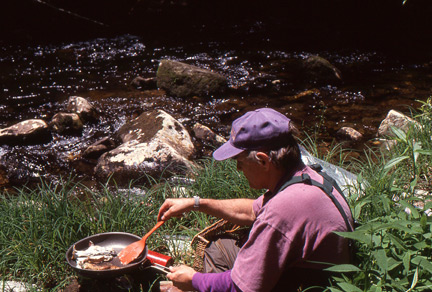 Sportsmen often talk about their “dog of a lifetime”—maybe a Lab or
Boykin which was a wizard at retrieving ducks or doves, perhaps a lanky
English pointer marking countless coveys of quail and making wondrous
finds on downed birds, or possibly a trusty beagle which was pure magic
on a cottontail’s trail. Such dogs ingrain themselves in our memories
and add meaning to sporting tales long after they are gone.
Sportsmen often talk about their “dog of a lifetime”—maybe a Lab or
Boykin which was a wizard at retrieving ducks or doves, perhaps a lanky
English pointer marking countless coveys of quail and making wondrous
finds on downed birds, or possibly a trusty beagle which was pure magic
on a cottontail’s trail. Such dogs ingrain themselves in our memories
and add meaning to sporting tales long after they are gone.
What we sometimes forget, however, is that hunters and fishermen also have endearing human companions. These are staunch individuals who, through the warmth and quirks of their personalities, the special nature of their character, or their rare ability to bring a boundless measure of pure pleasure to the outdoor experience, create lasting bonds. For me, Dr. Robert Scoville was assuredly a “friend of a lifetime.”
I’m not sure when we first met, although it was roughly four decades ago. But the circumstances of that meeting, and the succeeding three dozen or so meetings, remain abundantly clear. They all occurred in the emergency room of the old hospital on Ebenezer Road here in my Rock Hill, SC home, with Robert being called in to reduce my dislocated shoulder. It was in this unlikely setting I first began to get some measure of a remarkable man.
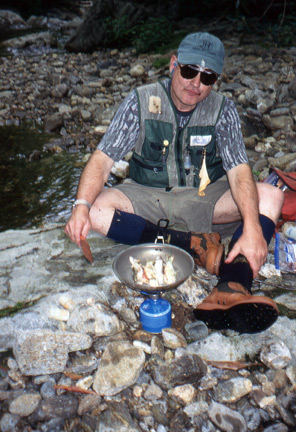 He was stubborn in the finest sense—determined, tenacious, unwilling to
let anything lick him, and gifted with an amazing ability to master
almost anything which interested him. Mind you, I suffered some from his
obstinacy, because before Robert so much as thought about injecting me
with a muscle relaxant in order to relocate my shoulder, he first had to
try it without drug intervention.
He was stubborn in the finest sense—determined, tenacious, unwilling to
let anything lick him, and gifted with an amazing ability to master
almost anything which interested him. Mind you, I suffered some from his
obstinacy, because before Robert so much as thought about injecting me
with a muscle relaxant in order to relocate my shoulder, he first had to
try it without drug intervention.
“Relax,” he would say, never mind that my shoulder hurt like all Satan’s minions had sunk tridents in it. “We’ll take care of this.” He’d reposition the table I was on, remove his shoe, stick his foot in my armpit, and commence pulling. The result was totally predictable—he couldn’t reduce the shoulder, and after trying would administer Demerol intravenously. Soon afterwards the wayward joint would be back in place.
In the aftermath of every episode we talked a bit and Robert would indicate I really needed shoulder surgery. I’d demur and soon we would be chatting about other things. Somehow he always found time to talk. Possibly that was because I was so ornery, but I suspect the truth is that Robert genuinely valued others. Certainly he possessed a rare talent. The man was a splendid listener.
Eventually, after three trips to the emergency room in two days, Robert convinced me surgery was essential. I agreed but added: “I want to be sure you do the job right. You’ll be paid, but as an added incentive, if you do a top-notch job I’ll teach you to fly fish for trout.” For a moment those bushy eyebrows, a tell-tale index to Robert’s mood, knitted in ominous fashion. Then, with his hallmark irresistible laugh, he half shouted, “By golly, that’s a deal.”
Thus began an extended period of magic in my life. Once I fully recovered we journeyed to the North Carolina high country for a backpacking/fishing trip on remote Big Snowbird Creek. I provided most of the angling equipment and rather foolishly told Robert he could manage without wading boots. As a result he wore slick tennis shoes, and if he floated his funky hat once he did it a dozen times, getting thoroughly soaked and cursing me roundly on each occasion. Yet Robert so joyed in the moment he scarcely noticed the cold. Eventually he was shivering almost uncontrollably and his lips were blue. At that point, as I reminded him often, I had the opportunity to play physician, insisting we stop fishing, climb out on a sun-warmed rock, and dry out before he became hypothermic.
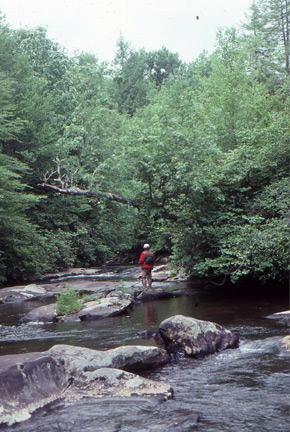 Later that day he caught his first wild trout, and when Robert brought
it to hand his primal shout of sheer delight rang off steep ridges and
down deep hollows like a mighty clap of thunder. That was the first of
countless times I witnessed his joie de vivre, his boundless zest
for life.
Later that day he caught his first wild trout, and when Robert brought
it to hand his primal shout of sheer delight rang off steep ridges and
down deep hollows like a mighty clap of thunder. That was the first of
countless times I witnessed his joie de vivre, his boundless zest
for life.
Similar stories run like golden threads through the entire fabric of our friendship—such as when I thought he had “frozen up” as a gobbler came to my calling; the time I surprised him with a breakfast of fresh-caught trout; when he lost a wager over whether I could retrieve a fly from his wayward cast when I told him he was “fishing for squirrels;” or when I teased him in front of a large audience of fly fishermen while showing slides of him in action and stating “here are examples of what not to do.”
Mind you, Robert gave as good as he got. One classic example came when he graciously agreed to speak at a national conference of outdoor writers for which I was program chair. His subject dealt with danger and accidents in the outdoors, but he opened his talk with two slides. The first showed him holding a huge rainbow trout well over two feet long. The second was an image of me Robert somehow had snapped without my knowledge. In it I held a tiny trout. “Jim Casada will tell you he taught me how to fly fish,” he said, “but pictures don’t lie. Who looks like the expert here?”
For decades we fished, camped, hiked, and hunted together, endlessly delighting in one another’s company. I came to love him like a brother and believe he felt the same way. I’ve never known a finer man. More telling is the fact that scores of people shared my perspective.
We often talk about individuals making their mark. Robert Scoville left visible marks on me in two places—scars where he worked his surgical wonders first on my shoulder and then, years later, on a wrist I crushed in a fall. Those are lasting marks, but the ones which really matter are invisible. They are on my heart and in my soul. Tight lines, my dear friend.
Thoughts on February Foods
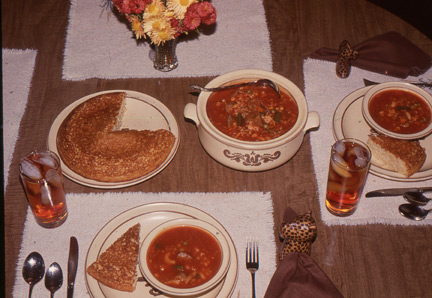 This
time of year, when it seems spring will never come, I like to think
about what Mom always called “comfort” foods. I’m sure the culinary
definition of comfort varies depending on where one lives, but I’ll
offer some thoughts on what it means to me by listing a bunch of items
which give me inner sustenance and calm not just hunger but the troubled
mind.
This
time of year, when it seems spring will never come, I like to think
about what Mom always called “comfort” foods. I’m sure the culinary
definition of comfort varies depending on where one lives, but I’ll
offer some thoughts on what it means to me by listing a bunch of items
which give me inner sustenance and calm not just hunger but the troubled
mind.
-
Hearty breakfasts featuring either sausage or sawmill gravy with cathead biscuits.
-
Pancakes (one of my real specialties in the kitchen—see below).
-
Homemade vegetable soup with lots of ground venison. We had a big pot last week, and it featured corn, green beans, lima beans, crowder peas, green peas, and tomatoes along with the meat.
-
Chicken and dumplings, with lots of broth.
-
A steaming hot pone of cornbread.
-
Stewed turnips topped with butter and black pepper.
-
Fruit or berry cobbler. Among the simplest of desserts to make (see recipe below), cobblers warm from the oven are a real taste treat.
-
Snow cream. Never mind dire statements about eating snow cream, I just don’t believe that the rare indulgence is going to do any damage.
-
Chicken or turkey noodle soup. This is an ideal way to use leftover stock and the bits of meat clinging to the carcass of a wild turkey, although half the time I turn it into more of a stew than a soup, eschewing the noodles and instead opting for ample amounts of onion, carrots, celery, and potatoes added to the meat and broth.
JIM’S PANCAKES
I don’t measure anything, but my approach is pretty straightforward. I use Hungry Jack pancake mix and to it add a bit of vegetable oil, an egg, and buttermilk (the latter is the key ingredient for light pancakes). Whisk until thoroughly mixed, adding buttermilk as needed to get the right consistency. You want batter that flows fairly easy and is not overly thick.
Heat a griddle until it is quite hot—the batter should begin to bubble soon after being placed on the grill—and adjust heat as needed. Pancakes should be turned only once. I like to “dress” mine up in various ways by adding any of a number of ingredients to the top before turning. Among these are chocolate chips, thin slices of banana, blueberries, raspberries, dried cranberries, or blackberries. Serve piping hot and slathered with butter using your favorite syrup or, my personal preference, honey.
NOTE: If you add any of the toppings mentioned above, they are going to make subsequent batches want to stick on your griddle. Just scrape it a bit with your turner and add a bit of oil before starting on the next batch of pancakes.
ANNA LOU’S FRUIT OR BERRY COBBLER
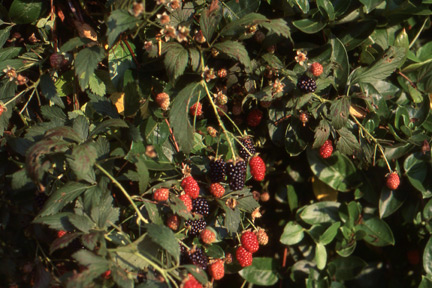 I’ve
shared this recipe before but it is so simple and so scrumptious it
merits repeating. Incidentally, Anna Lou was my mother, and over the
course of my boyhood I would estimate, probably conservatively, that she
prepared this dish at least twenty times a year.
I’ve
shared this recipe before but it is so simple and so scrumptious it
merits repeating. Incidentally, Anna Lou was my mother, and over the
course of my boyhood I would estimate, probably conservatively, that she
prepared this dish at least twenty times a year.
1 cup all-purpose flour
1 cup sugar (reduce a bit if you don’t want the cobbler overly sweet)
2 teaspoons baking powder
1 cup milk
¼ cup butter, melted
2-4 cups fresh berries, or peaches, apples, or dried apricots which have
been soaked for several hours
Combine flour, sugar, baking powder and milk; stir with a wire whisk until smooth. Add melted butter and blend. Pour batter into 9 x 13-inch baking dish. Pour berries or fruit (amount depends on personal preference and whether you like a lot of crust or a lot of fruit) evenly over batter. Do not stir. Bake at 350 degrees for 30-40 minutes or until golden brown. Serve warm by itself or with vanilla ice cream, cream, whipped topping, or milk.
Thank you for subscribing to the
Jim Casada Outdoors
newsletter.
Feel free to contact Jim with your comments, questions
or suggestions at jc@jimcasadaoutdoors.com.
Send mail to
webmaster@jimcasadaoutdoors.com with
questions or comments about this Web site.
Copyright © 2004-2011 JimCasadaOutdoors.com. Last modified:
12/02/14 .
Web site design by
Wordman, LLC
